Role of Nurse Practitioners in Renal Care: Skills, Challenges and Standards
VerifiedAdded on 2023/06/05
|11
|3737
|81
AI Summary
This report discusses the role of nurse practitioners in renal care, including their specific skills, clinical challenges, and standards of practice. It also covers the registration requirements for nurse practitioners and their importance in the healthcare setting.
Contribute Materials
Your contribution can guide someone’s learning journey. Share your
documents today.
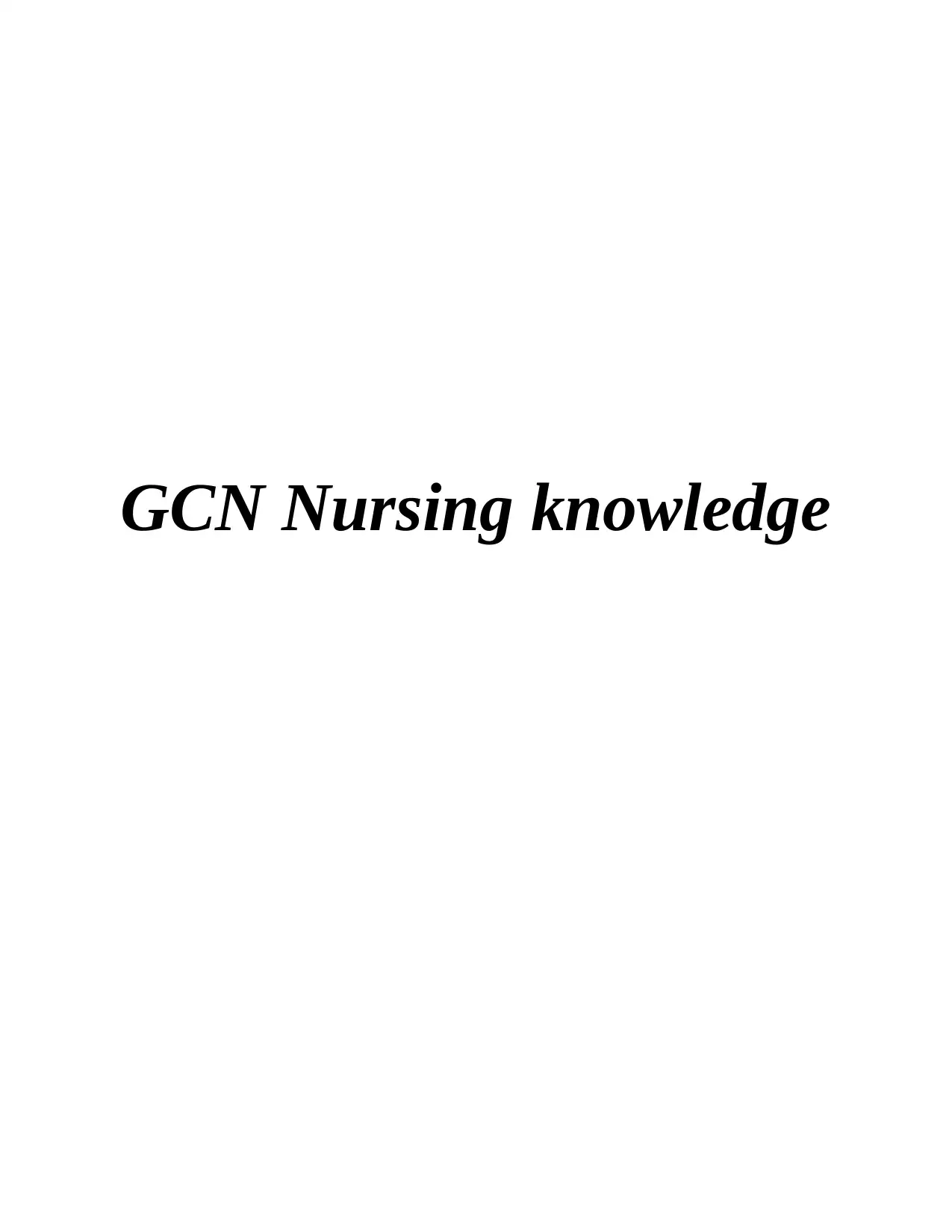
GCN Nursing knowledge
Secure Best Marks with AI Grader
Need help grading? Try our AI Grader for instant feedback on your assignments.
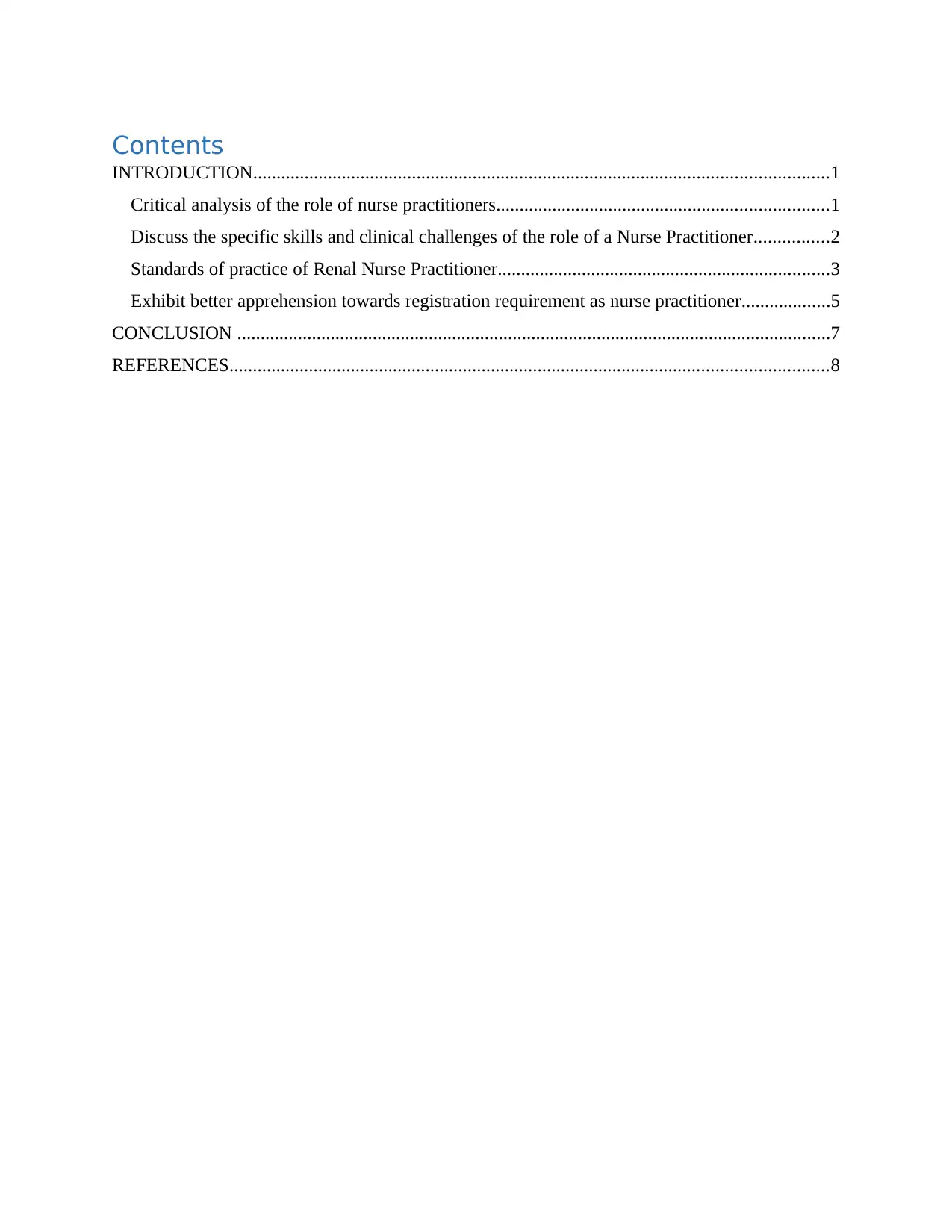
Contents
INTRODUCTION...........................................................................................................................1
Critical analysis of the role of nurse practitioners.......................................................................1
Discuss the specific skills and clinical challenges of the role of a Nurse Practitioner................2
Standards of practice of Renal Nurse Practitioner.......................................................................3
Exhibit better apprehension towards registration requirement as nurse practitioner...................5
CONCLUSION ...............................................................................................................................7
REFERENCES................................................................................................................................8
INTRODUCTION...........................................................................................................................1
Critical analysis of the role of nurse practitioners.......................................................................1
Discuss the specific skills and clinical challenges of the role of a Nurse Practitioner................2
Standards of practice of Renal Nurse Practitioner.......................................................................3
Exhibit better apprehension towards registration requirement as nurse practitioner...................5
CONCLUSION ...............................................................................................................................7
REFERENCES................................................................................................................................8
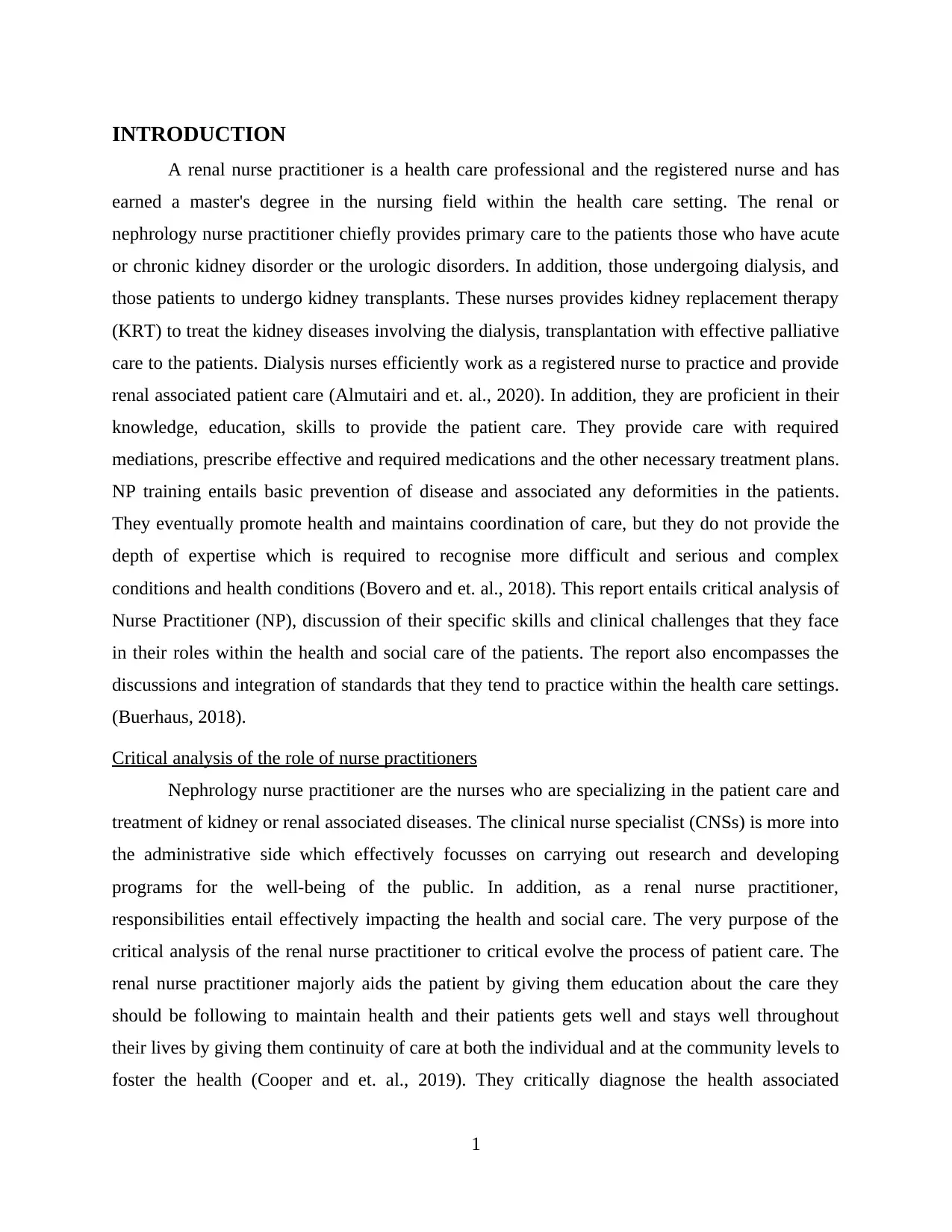
INTRODUCTION
A renal nurse practitioner is a health care professional and the registered nurse and has
earned a master's degree in the nursing field within the health care setting. The renal or
nephrology nurse practitioner chiefly provides primary care to the patients those who have acute
or chronic kidney disorder or the urologic disorders. In addition, those undergoing dialysis, and
those patients to undergo kidney transplants. These nurses provides kidney replacement therapy
(KRT) to treat the kidney diseases involving the dialysis, transplantation with effective palliative
care to the patients. Dialysis nurses efficiently work as a registered nurse to practice and provide
renal associated patient care (Almutairi and et. al., 2020). In addition, they are proficient in their
knowledge, education, skills to provide the patient care. They provide care with required
mediations, prescribe effective and required medications and the other necessary treatment plans.
NP training entails basic prevention of disease and associated any deformities in the patients.
They eventually promote health and maintains coordination of care, but they do not provide the
depth of expertise which is required to recognise more difficult and serious and complex
conditions and health conditions (Bovero and et. al., 2018). This report entails critical analysis of
Nurse Practitioner (NP), discussion of their specific skills and clinical challenges that they face
in their roles within the health and social care of the patients. The report also encompasses the
discussions and integration of standards that they tend to practice within the health care settings.
(Buerhaus, 2018).
Critical analysis of the role of nurse practitioners
Nephrology nurse practitioner are the nurses who are specializing in the patient care and
treatment of kidney or renal associated diseases. The clinical nurse specialist (CNSs) is more into
the administrative side which effectively focusses on carrying out research and developing
programs for the well-being of the public. In addition, as a renal nurse practitioner,
responsibilities entail effectively impacting the health and social care. The very purpose of the
critical analysis of the renal nurse practitioner to critical evolve the process of patient care. The
renal nurse practitioner majorly aids the patient by giving them education about the care they
should be following to maintain health and their patients gets well and stays well throughout
their lives by giving them continuity of care at both the individual and at the community levels to
foster the health (Cooper and et. al., 2019). They critically diagnose the health associated
1
A renal nurse practitioner is a health care professional and the registered nurse and has
earned a master's degree in the nursing field within the health care setting. The renal or
nephrology nurse practitioner chiefly provides primary care to the patients those who have acute
or chronic kidney disorder or the urologic disorders. In addition, those undergoing dialysis, and
those patients to undergo kidney transplants. These nurses provides kidney replacement therapy
(KRT) to treat the kidney diseases involving the dialysis, transplantation with effective palliative
care to the patients. Dialysis nurses efficiently work as a registered nurse to practice and provide
renal associated patient care (Almutairi and et. al., 2020). In addition, they are proficient in their
knowledge, education, skills to provide the patient care. They provide care with required
mediations, prescribe effective and required medications and the other necessary treatment plans.
NP training entails basic prevention of disease and associated any deformities in the patients.
They eventually promote health and maintains coordination of care, but they do not provide the
depth of expertise which is required to recognise more difficult and serious and complex
conditions and health conditions (Bovero and et. al., 2018). This report entails critical analysis of
Nurse Practitioner (NP), discussion of their specific skills and clinical challenges that they face
in their roles within the health and social care of the patients. The report also encompasses the
discussions and integration of standards that they tend to practice within the health care settings.
(Buerhaus, 2018).
Critical analysis of the role of nurse practitioners
Nephrology nurse practitioner are the nurses who are specializing in the patient care and
treatment of kidney or renal associated diseases. The clinical nurse specialist (CNSs) is more into
the administrative side which effectively focusses on carrying out research and developing
programs for the well-being of the public. In addition, as a renal nurse practitioner,
responsibilities entail effectively impacting the health and social care. The very purpose of the
critical analysis of the renal nurse practitioner to critical evolve the process of patient care. The
renal nurse practitioner majorly aids the patient by giving them education about the care they
should be following to maintain health and their patients gets well and stays well throughout
their lives by giving them continuity of care at both the individual and at the community levels to
foster the health (Cooper and et. al., 2019). They critically diagnose the health associated
1
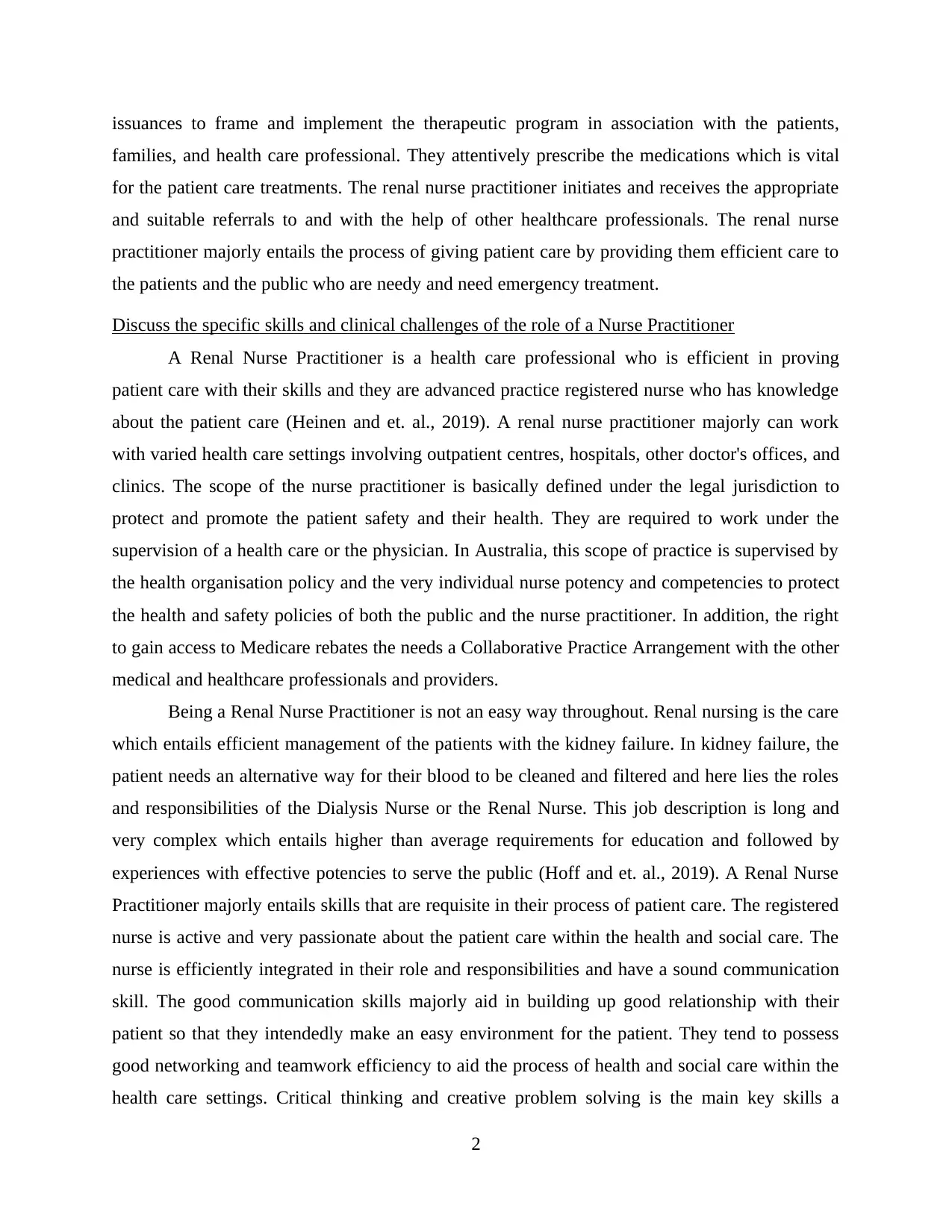
issuances to frame and implement the therapeutic program in association with the patients,
families, and health care professional. They attentively prescribe the medications which is vital
for the patient care treatments. The renal nurse practitioner initiates and receives the appropriate
and suitable referrals to and with the help of other healthcare professionals. The renal nurse
practitioner majorly entails the process of giving patient care by providing them efficient care to
the patients and the public who are needy and need emergency treatment.
Discuss the specific skills and clinical challenges of the role of a Nurse Practitioner
A Renal Nurse Practitioner is a health care professional who is efficient in proving
patient care with their skills and they are advanced practice registered nurse who has knowledge
about the patient care (Heinen and et. al., 2019). A renal nurse practitioner majorly can work
with varied health care settings involving outpatient centres, hospitals, other doctor's offices, and
clinics. The scope of the nurse practitioner is basically defined under the legal jurisdiction to
protect and promote the patient safety and their health. They are required to work under the
supervision of a health care or the physician. In Australia, this scope of practice is supervised by
the health organisation policy and the very individual nurse potency and competencies to protect
the health and safety policies of both the public and the nurse practitioner. In addition, the right
to gain access to Medicare rebates the needs a Collaborative Practice Arrangement with the other
medical and healthcare professionals and providers.
Being a Renal Nurse Practitioner is not an easy way throughout. Renal nursing is the care
which entails efficient management of the patients with the kidney failure. In kidney failure, the
patient needs an alternative way for their blood to be cleaned and filtered and here lies the roles
and responsibilities of the Dialysis Nurse or the Renal Nurse. This job description is long and
very complex which entails higher than average requirements for education and followed by
experiences with effective potencies to serve the public (Hoff and et. al., 2019). A Renal Nurse
Practitioner majorly entails skills that are requisite in their process of patient care. The registered
nurse is active and very passionate about the patient care within the health and social care. The
nurse is efficiently integrated in their role and responsibilities and have a sound communication
skill. The good communication skills majorly aid in building up good relationship with their
patient so that they intendedly make an easy environment for the patient. They tend to possess
good networking and teamwork efficiency to aid the process of health and social care within the
health care settings. Critical thinking and creative problem solving is the main key skills a
2
families, and health care professional. They attentively prescribe the medications which is vital
for the patient care treatments. The renal nurse practitioner initiates and receives the appropriate
and suitable referrals to and with the help of other healthcare professionals. The renal nurse
practitioner majorly entails the process of giving patient care by providing them efficient care to
the patients and the public who are needy and need emergency treatment.
Discuss the specific skills and clinical challenges of the role of a Nurse Practitioner
A Renal Nurse Practitioner is a health care professional who is efficient in proving
patient care with their skills and they are advanced practice registered nurse who has knowledge
about the patient care (Heinen and et. al., 2019). A renal nurse practitioner majorly can work
with varied health care settings involving outpatient centres, hospitals, other doctor's offices, and
clinics. The scope of the nurse practitioner is basically defined under the legal jurisdiction to
protect and promote the patient safety and their health. They are required to work under the
supervision of a health care or the physician. In Australia, this scope of practice is supervised by
the health organisation policy and the very individual nurse potency and competencies to protect
the health and safety policies of both the public and the nurse practitioner. In addition, the right
to gain access to Medicare rebates the needs a Collaborative Practice Arrangement with the other
medical and healthcare professionals and providers.
Being a Renal Nurse Practitioner is not an easy way throughout. Renal nursing is the care
which entails efficient management of the patients with the kidney failure. In kidney failure, the
patient needs an alternative way for their blood to be cleaned and filtered and here lies the roles
and responsibilities of the Dialysis Nurse or the Renal Nurse. This job description is long and
very complex which entails higher than average requirements for education and followed by
experiences with effective potencies to serve the public (Hoff and et. al., 2019). A Renal Nurse
Practitioner majorly entails skills that are requisite in their process of patient care. The registered
nurse is active and very passionate about the patient care within the health and social care. The
nurse is efficiently integrated in their role and responsibilities and have a sound communication
skill. The good communication skills majorly aid in building up good relationship with their
patient so that they intendedly make an easy environment for the patient. They tend to possess
good networking and teamwork efficiency to aid the process of health and social care within the
health care settings. Critical thinking and creative problem solving is the main key skills a
2
Secure Best Marks with AI Grader
Need help grading? Try our AI Grader for instant feedback on your assignments.
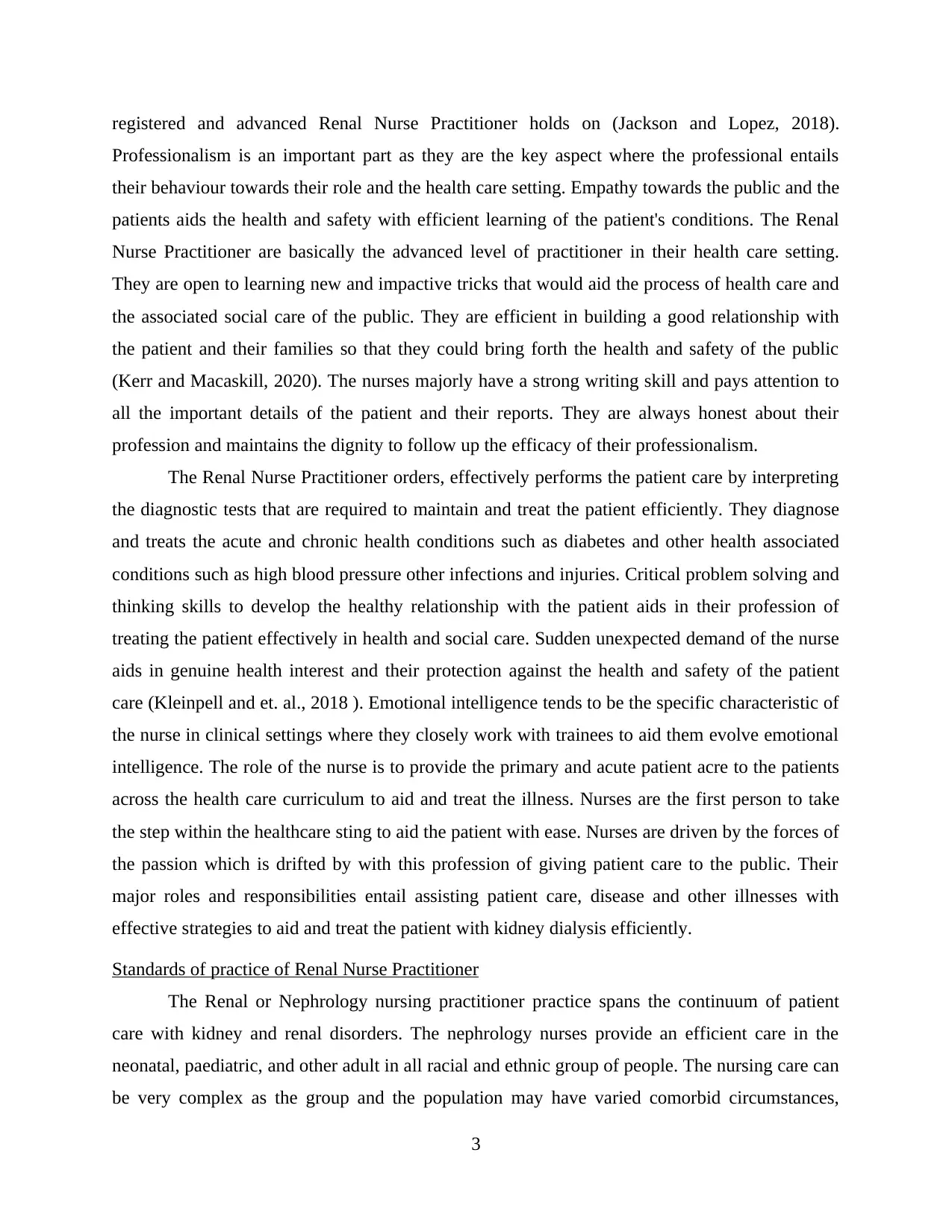
registered and advanced Renal Nurse Practitioner holds on (Jackson and Lopez, 2018).
Professionalism is an important part as they are the key aspect where the professional entails
their behaviour towards their role and the health care setting. Empathy towards the public and the
patients aids the health and safety with efficient learning of the patient's conditions. The Renal
Nurse Practitioner are basically the advanced level of practitioner in their health care setting.
They are open to learning new and impactive tricks that would aid the process of health care and
the associated social care of the public. They are efficient in building a good relationship with
the patient and their families so that they could bring forth the health and safety of the public
(Kerr and Macaskill, 2020). The nurses majorly have a strong writing skill and pays attention to
all the important details of the patient and their reports. They are always honest about their
profession and maintains the dignity to follow up the efficacy of their professionalism.
The Renal Nurse Practitioner orders, effectively performs the patient care by interpreting
the diagnostic tests that are required to maintain and treat the patient efficiently. They diagnose
and treats the acute and chronic health conditions such as diabetes and other health associated
conditions such as high blood pressure other infections and injuries. Critical problem solving and
thinking skills to develop the healthy relationship with the patient aids in their profession of
treating the patient effectively in health and social care. Sudden unexpected demand of the nurse
aids in genuine health interest and their protection against the health and safety of the patient
care (Kleinpell and et. al., 2018 ). Emotional intelligence tends to be the specific characteristic of
the nurse in clinical settings where they closely work with trainees to aid them evolve emotional
intelligence. The role of the nurse is to provide the primary and acute patient acre to the patients
across the health care curriculum to aid and treat the illness. Nurses are the first person to take
the step within the healthcare sting to aid the patient with ease. Nurses are driven by the forces of
the passion which is drifted by with this profession of giving patient care to the public. Their
major roles and responsibilities entail assisting patient care, disease and other illnesses with
effective strategies to aid and treat the patient with kidney dialysis efficiently.
Standards of practice of Renal Nurse Practitioner
The Renal or Nephrology nursing practitioner practice spans the continuum of patient
care with kidney and renal disorders. The nephrology nurses provide an efficient care in the
neonatal, paediatric, and other adult in all racial and ethnic group of people. The nursing care can
be very complex as the group and the population may have varied comorbid circumstances,
3
Professionalism is an important part as they are the key aspect where the professional entails
their behaviour towards their role and the health care setting. Empathy towards the public and the
patients aids the health and safety with efficient learning of the patient's conditions. The Renal
Nurse Practitioner are basically the advanced level of practitioner in their health care setting.
They are open to learning new and impactive tricks that would aid the process of health care and
the associated social care of the public. They are efficient in building a good relationship with
the patient and their families so that they could bring forth the health and safety of the public
(Kerr and Macaskill, 2020). The nurses majorly have a strong writing skill and pays attention to
all the important details of the patient and their reports. They are always honest about their
profession and maintains the dignity to follow up the efficacy of their professionalism.
The Renal Nurse Practitioner orders, effectively performs the patient care by interpreting
the diagnostic tests that are required to maintain and treat the patient efficiently. They diagnose
and treats the acute and chronic health conditions such as diabetes and other health associated
conditions such as high blood pressure other infections and injuries. Critical problem solving and
thinking skills to develop the healthy relationship with the patient aids in their profession of
treating the patient effectively in health and social care. Sudden unexpected demand of the nurse
aids in genuine health interest and their protection against the health and safety of the patient
care (Kleinpell and et. al., 2018 ). Emotional intelligence tends to be the specific characteristic of
the nurse in clinical settings where they closely work with trainees to aid them evolve emotional
intelligence. The role of the nurse is to provide the primary and acute patient acre to the patients
across the health care curriculum to aid and treat the illness. Nurses are the first person to take
the step within the healthcare sting to aid the patient with ease. Nurses are driven by the forces of
the passion which is drifted by with this profession of giving patient care to the public. Their
major roles and responsibilities entail assisting patient care, disease and other illnesses with
effective strategies to aid and treat the patient with kidney dialysis efficiently.
Standards of practice of Renal Nurse Practitioner
The Renal or Nephrology nursing practitioner practice spans the continuum of patient
care with kidney and renal disorders. The nephrology nurses provide an efficient care in the
neonatal, paediatric, and other adult in all racial and ethnic group of people. The nursing care can
be very complex as the group and the population may have varied comorbid circumstances,
3
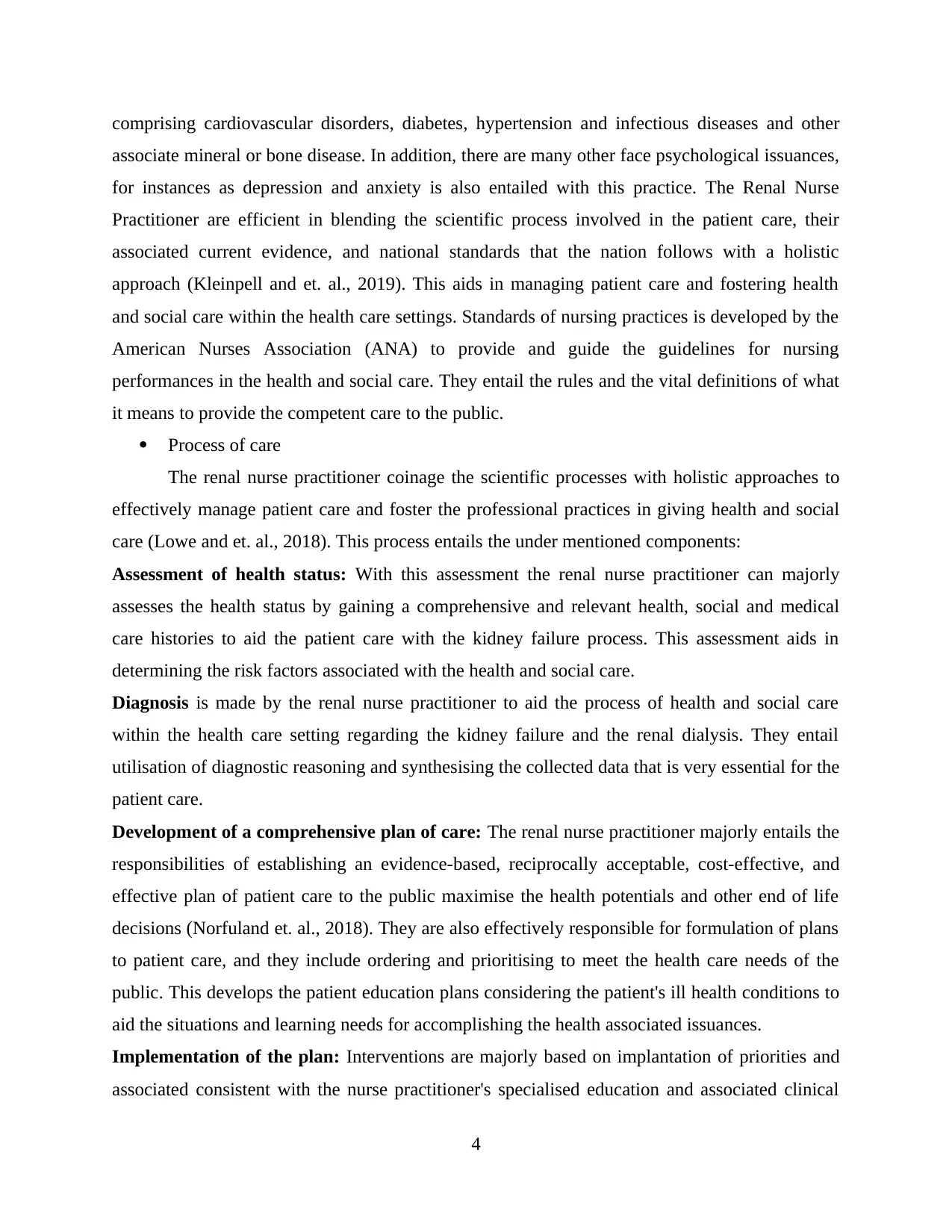
comprising cardiovascular disorders, diabetes, hypertension and infectious diseases and other
associate mineral or bone disease. In addition, there are many other face psychological issuances,
for instances as depression and anxiety is also entailed with this practice. The Renal Nurse
Practitioner are efficient in blending the scientific process involved in the patient care, their
associated current evidence, and national standards that the nation follows with a holistic
approach (Kleinpell and et. al., 2019). This aids in managing patient care and fostering health
and social care within the health care settings. Standards of nursing practices is developed by the
American Nurses Association (ANA) to provide and guide the guidelines for nursing
performances in the health and social care. They entail the rules and the vital definitions of what
it means to provide the competent care to the public.
Process of care
The renal nurse practitioner coinage the scientific processes with holistic approaches to
effectively manage patient care and foster the professional practices in giving health and social
care (Lowe and et. al., 2018). This process entails the under mentioned components:
Assessment of health status: With this assessment the renal nurse practitioner can majorly
assesses the health status by gaining a comprehensive and relevant health, social and medical
care histories to aid the patient care with the kidney failure process. This assessment aids in
determining the risk factors associated with the health and social care.
Diagnosis is made by the renal nurse practitioner to aid the process of health and social care
within the health care setting regarding the kidney failure and the renal dialysis. They entail
utilisation of diagnostic reasoning and synthesising the collected data that is very essential for the
patient care.
Development of a comprehensive plan of care: The renal nurse practitioner majorly entails the
responsibilities of establishing an evidence-based, reciprocally acceptable, cost-effective, and
effective plan of patient care to the public maximise the health potentials and other end of life
decisions (Norfuland et. al., 2018). They are also effectively responsible for formulation of plans
to patient care, and they include ordering and prioritising to meet the health care needs of the
public. This develops the patient education plans considering the patient's ill health conditions to
aid the situations and learning needs for accomplishing the health associated issuances.
Implementation of the plan: Interventions are majorly based on implantation of priorities and
associated consistent with the nurse practitioner's specialised education and associated clinical
4
associate mineral or bone disease. In addition, there are many other face psychological issuances,
for instances as depression and anxiety is also entailed with this practice. The Renal Nurse
Practitioner are efficient in blending the scientific process involved in the patient care, their
associated current evidence, and national standards that the nation follows with a holistic
approach (Kleinpell and et. al., 2019). This aids in managing patient care and fostering health
and social care within the health care settings. Standards of nursing practices is developed by the
American Nurses Association (ANA) to provide and guide the guidelines for nursing
performances in the health and social care. They entail the rules and the vital definitions of what
it means to provide the competent care to the public.
Process of care
The renal nurse practitioner coinage the scientific processes with holistic approaches to
effectively manage patient care and foster the professional practices in giving health and social
care (Lowe and et. al., 2018). This process entails the under mentioned components:
Assessment of health status: With this assessment the renal nurse practitioner can majorly
assesses the health status by gaining a comprehensive and relevant health, social and medical
care histories to aid the patient care with the kidney failure process. This assessment aids in
determining the risk factors associated with the health and social care.
Diagnosis is made by the renal nurse practitioner to aid the process of health and social care
within the health care setting regarding the kidney failure and the renal dialysis. They entail
utilisation of diagnostic reasoning and synthesising the collected data that is very essential for the
patient care.
Development of a comprehensive plan of care: The renal nurse practitioner majorly entails the
responsibilities of establishing an evidence-based, reciprocally acceptable, cost-effective, and
effective plan of patient care to the public maximise the health potentials and other end of life
decisions (Norfuland et. al., 2018). They are also effectively responsible for formulation of plans
to patient care, and they include ordering and prioritising to meet the health care needs of the
public. This develops the patient education plans considering the patient's ill health conditions to
aid the situations and learning needs for accomplishing the health associated issuances.
Implementation of the plan: Interventions are majorly based on implantation of priorities and
associated consistent with the nurse practitioner's specialised education and associated clinical
4
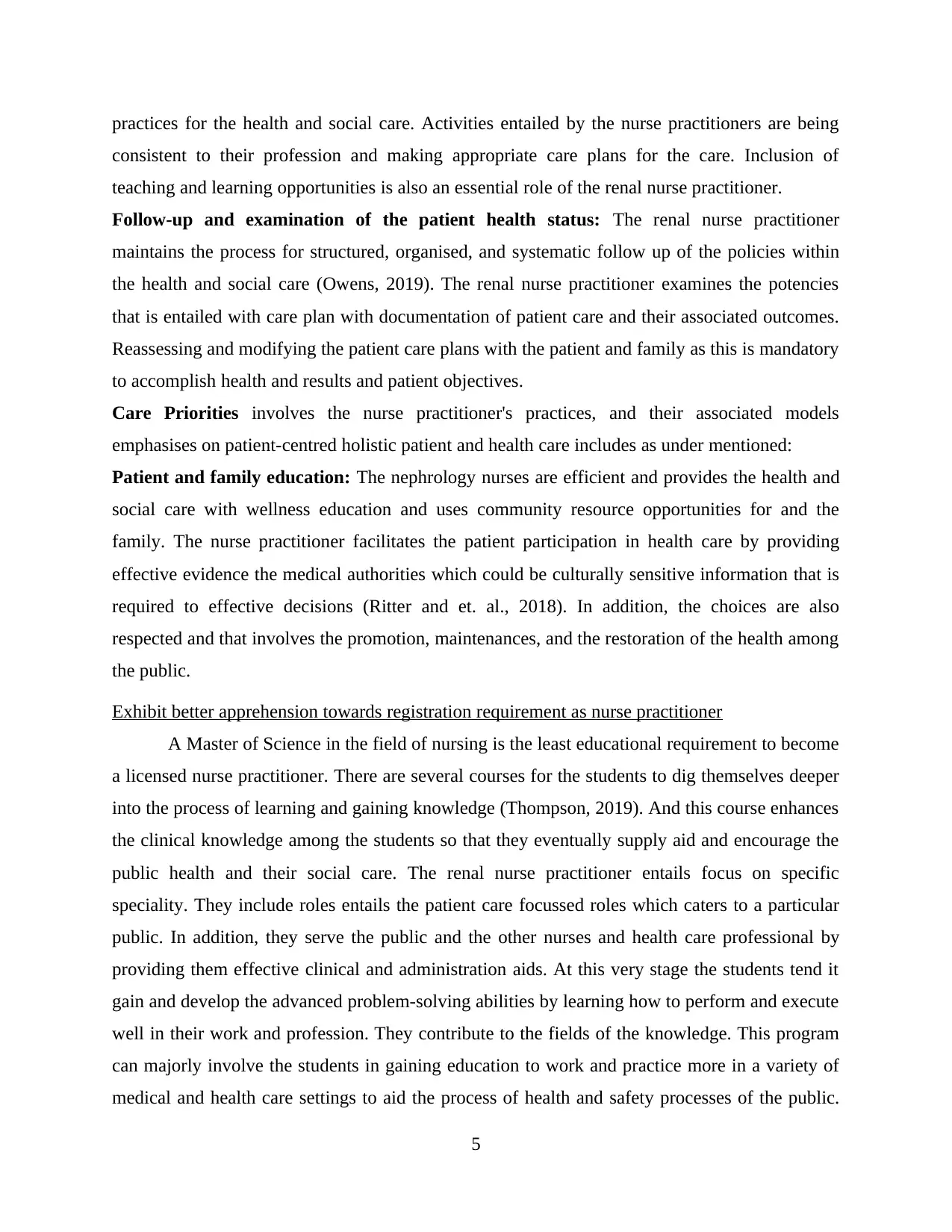
practices for the health and social care. Activities entailed by the nurse practitioners are being
consistent to their profession and making appropriate care plans for the care. Inclusion of
teaching and learning opportunities is also an essential role of the renal nurse practitioner.
Follow-up and examination of the patient health status: The renal nurse practitioner
maintains the process for structured, organised, and systematic follow up of the policies within
the health and social care (Owens, 2019). The renal nurse practitioner examines the potencies
that is entailed with care plan with documentation of patient care and their associated outcomes.
Reassessing and modifying the patient care plans with the patient and family as this is mandatory
to accomplish health and results and patient objectives.
Care Priorities involves the nurse practitioner's practices, and their associated models
emphasises on patient-centred holistic patient and health care includes as under mentioned:
Patient and family education: The nephrology nurses are efficient and provides the health and
social care with wellness education and uses community resource opportunities for and the
family. The nurse practitioner facilitates the patient participation in health care by providing
effective evidence the medical authorities which could be culturally sensitive information that is
required to effective decisions (Ritter and et. al., 2018). In addition, the choices are also
respected and that involves the promotion, maintenances, and the restoration of the health among
the public.
Exhibit better apprehension towards registration requirement as nurse practitioner
A Master of Science in the field of nursing is the least educational requirement to become
a licensed nurse practitioner. There are several courses for the students to dig themselves deeper
into the process of learning and gaining knowledge (Thompson, 2019). And this course enhances
the clinical knowledge among the students so that they eventually supply aid and encourage the
public health and their social care. The renal nurse practitioner entails focus on specific
speciality. They include roles entails the patient care focussed roles which caters to a particular
public. In addition, they serve the public and the other nurses and health care professional by
providing them effective clinical and administration aids. At this very stage the students tend it
gain and develop the advanced problem-solving abilities by learning how to perform and execute
well in their work and profession. They contribute to the fields of the knowledge. This program
can majorly involve the students in gaining education to work and practice more in a variety of
medical and health care settings to aid the process of health and safety processes of the public.
5
consistent to their profession and making appropriate care plans for the care. Inclusion of
teaching and learning opportunities is also an essential role of the renal nurse practitioner.
Follow-up and examination of the patient health status: The renal nurse practitioner
maintains the process for structured, organised, and systematic follow up of the policies within
the health and social care (Owens, 2019). The renal nurse practitioner examines the potencies
that is entailed with care plan with documentation of patient care and their associated outcomes.
Reassessing and modifying the patient care plans with the patient and family as this is mandatory
to accomplish health and results and patient objectives.
Care Priorities involves the nurse practitioner's practices, and their associated models
emphasises on patient-centred holistic patient and health care includes as under mentioned:
Patient and family education: The nephrology nurses are efficient and provides the health and
social care with wellness education and uses community resource opportunities for and the
family. The nurse practitioner facilitates the patient participation in health care by providing
effective evidence the medical authorities which could be culturally sensitive information that is
required to effective decisions (Ritter and et. al., 2018). In addition, the choices are also
respected and that involves the promotion, maintenances, and the restoration of the health among
the public.
Exhibit better apprehension towards registration requirement as nurse practitioner
A Master of Science in the field of nursing is the least educational requirement to become
a licensed nurse practitioner. There are several courses for the students to dig themselves deeper
into the process of learning and gaining knowledge (Thompson, 2019). And this course enhances
the clinical knowledge among the students so that they eventually supply aid and encourage the
public health and their social care. The renal nurse practitioner entails focus on specific
speciality. They include roles entails the patient care focussed roles which caters to a particular
public. In addition, they serve the public and the other nurses and health care professional by
providing them effective clinical and administration aids. At this very stage the students tend it
gain and develop the advanced problem-solving abilities by learning how to perform and execute
well in their work and profession. They contribute to the fields of the knowledge. This program
can majorly involve the students in gaining education to work and practice more in a variety of
medical and health care settings to aid the process of health and safety processes of the public.
5
Paraphrase This Document
Need a fresh take? Get an instant paraphrase of this document with our AI Paraphraser
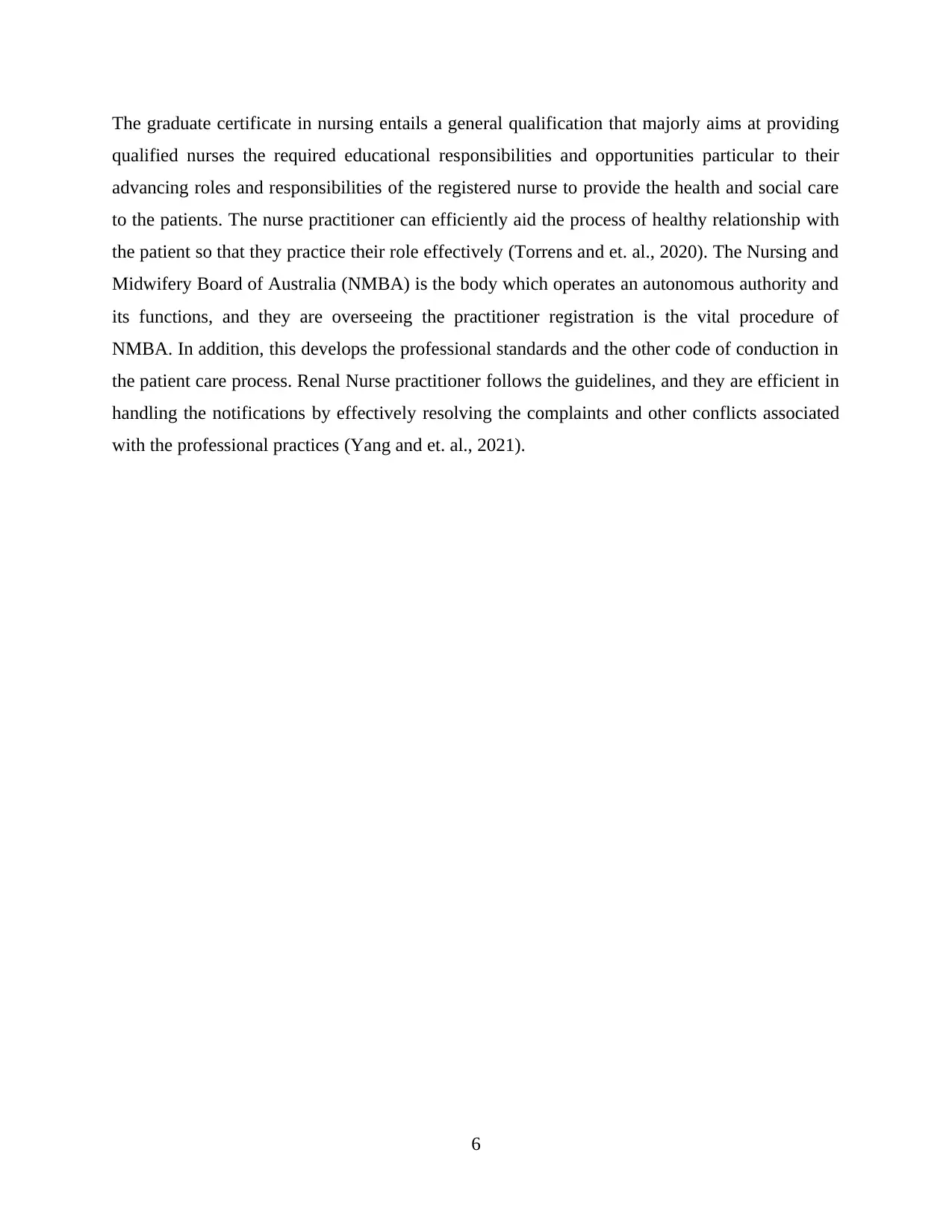
The graduate certificate in nursing entails a general qualification that majorly aims at providing
qualified nurses the required educational responsibilities and opportunities particular to their
advancing roles and responsibilities of the registered nurse to provide the health and social care
to the patients. The nurse practitioner can efficiently aid the process of healthy relationship with
the patient so that they practice their role effectively (Torrens and et. al., 2020). The Nursing and
Midwifery Board of Australia (NMBA) is the body which operates an autonomous authority and
its functions, and they are overseeing the practitioner registration is the vital procedure of
NMBA. In addition, this develops the professional standards and the other code of conduction in
the patient care process. Renal Nurse practitioner follows the guidelines, and they are efficient in
handling the notifications by effectively resolving the complaints and other conflicts associated
with the professional practices (Yang and et. al., 2021).
6
qualified nurses the required educational responsibilities and opportunities particular to their
advancing roles and responsibilities of the registered nurse to provide the health and social care
to the patients. The nurse practitioner can efficiently aid the process of healthy relationship with
the patient so that they practice their role effectively (Torrens and et. al., 2020). The Nursing and
Midwifery Board of Australia (NMBA) is the body which operates an autonomous authority and
its functions, and they are overseeing the practitioner registration is the vital procedure of
NMBA. In addition, this develops the professional standards and the other code of conduction in
the patient care process. Renal Nurse practitioner follows the guidelines, and they are efficient in
handling the notifications by effectively resolving the complaints and other conflicts associated
with the professional practices (Yang and et. al., 2021).
6
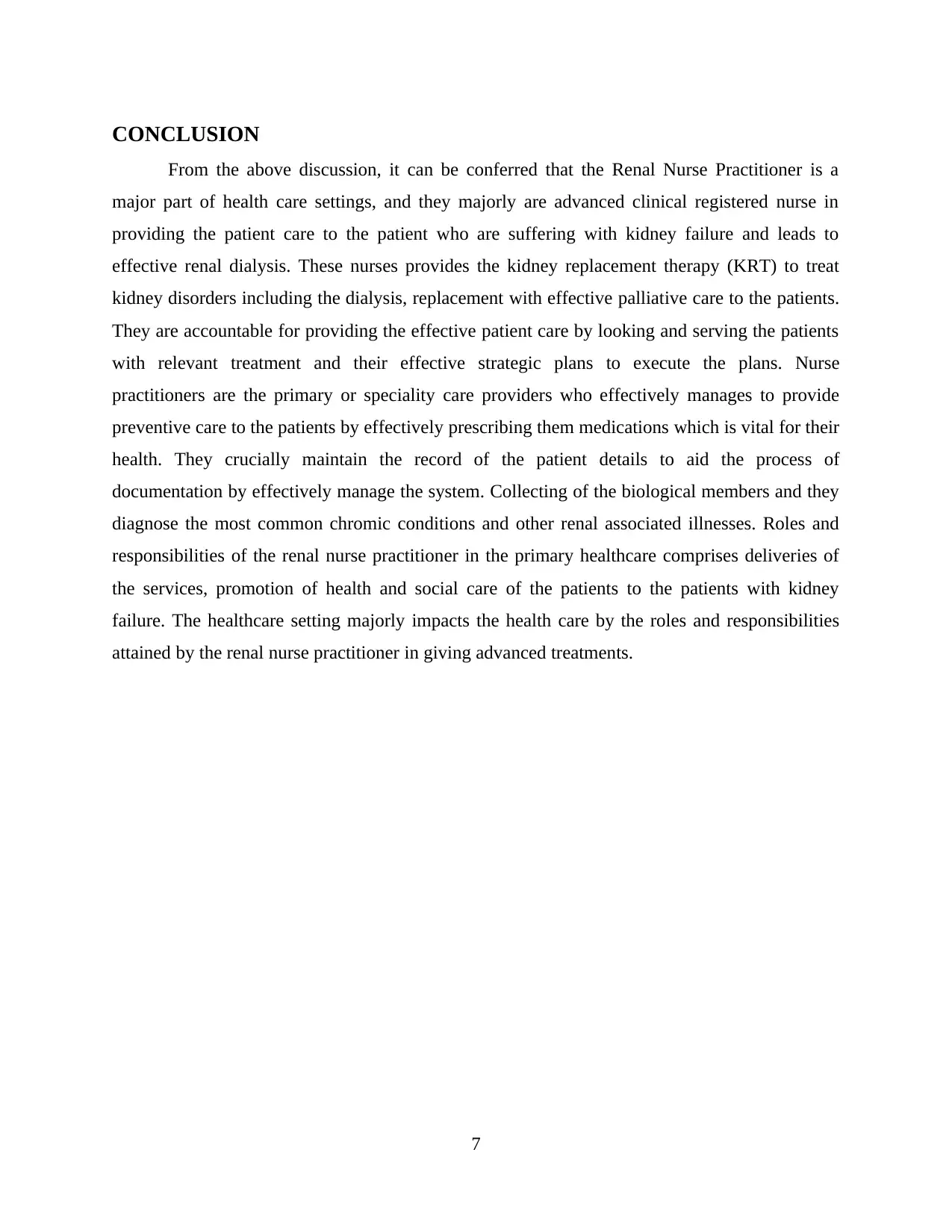
CONCLUSION
From the above discussion, it can be conferred that the Renal Nurse Practitioner is a
major part of health care settings, and they majorly are advanced clinical registered nurse in
providing the patient care to the patient who are suffering with kidney failure and leads to
effective renal dialysis. These nurses provides the kidney replacement therapy (KRT) to treat
kidney disorders including the dialysis, replacement with effective palliative care to the patients.
They are accountable for providing the effective patient care by looking and serving the patients
with relevant treatment and their effective strategic plans to execute the plans. Nurse
practitioners are the primary or speciality care providers who effectively manages to provide
preventive care to the patients by effectively prescribing them medications which is vital for their
health. They crucially maintain the record of the patient details to aid the process of
documentation by effectively manage the system. Collecting of the biological members and they
diagnose the most common chromic conditions and other renal associated illnesses. Roles and
responsibilities of the renal nurse practitioner in the primary healthcare comprises deliveries of
the services, promotion of health and social care of the patients to the patients with kidney
failure. The healthcare setting majorly impacts the health care by the roles and responsibilities
attained by the renal nurse practitioner in giving advanced treatments.
7
From the above discussion, it can be conferred that the Renal Nurse Practitioner is a
major part of health care settings, and they majorly are advanced clinical registered nurse in
providing the patient care to the patient who are suffering with kidney failure and leads to
effective renal dialysis. These nurses provides the kidney replacement therapy (KRT) to treat
kidney disorders including the dialysis, replacement with effective palliative care to the patients.
They are accountable for providing the effective patient care by looking and serving the patients
with relevant treatment and their effective strategic plans to execute the plans. Nurse
practitioners are the primary or speciality care providers who effectively manages to provide
preventive care to the patients by effectively prescribing them medications which is vital for their
health. They crucially maintain the record of the patient details to aid the process of
documentation by effectively manage the system. Collecting of the biological members and they
diagnose the most common chromic conditions and other renal associated illnesses. Roles and
responsibilities of the renal nurse practitioner in the primary healthcare comprises deliveries of
the services, promotion of health and social care of the patients to the patients with kidney
failure. The healthcare setting majorly impacts the health care by the roles and responsibilities
attained by the renal nurse practitioner in giving advanced treatments.
7
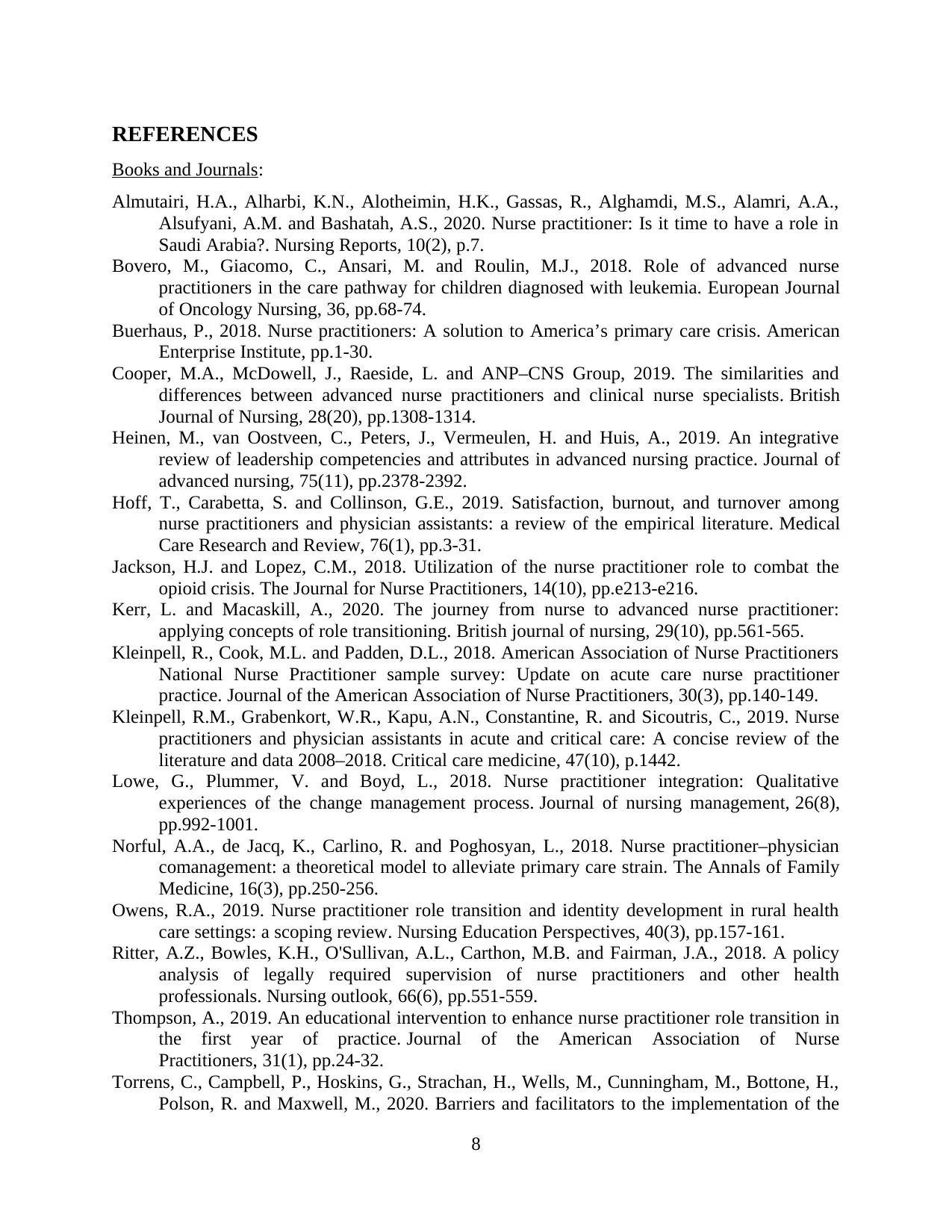
REFERENCES
Books and Journals:
Almutairi, H.A., Alharbi, K.N., Alotheimin, H.K., Gassas, R., Alghamdi, M.S., Alamri, A.A.,
Alsufyani, A.M. and Bashatah, A.S., 2020. Nurse practitioner: Is it time to have a role in
Saudi Arabia?. Nursing Reports, 10(2), p.7.
Bovero, M., Giacomo, C., Ansari, M. and Roulin, M.J., 2018. Role of advanced nurse
practitioners in the care pathway for children diagnosed with leukemia. European Journal
of Oncology Nursing, 36, pp.68-74.
Buerhaus, P., 2018. Nurse practitioners: A solution to America’s primary care crisis. American
Enterprise Institute, pp.1-30.
Cooper, M.A., McDowell, J., Raeside, L. and ANP–CNS Group, 2019. The similarities and
differences between advanced nurse practitioners and clinical nurse specialists. British
Journal of Nursing, 28(20), pp.1308-1314.
Heinen, M., van Oostveen, C., Peters, J., Vermeulen, H. and Huis, A., 2019. An integrative
review of leadership competencies and attributes in advanced nursing practice. Journal of
advanced nursing, 75(11), pp.2378-2392.
Hoff, T., Carabetta, S. and Collinson, G.E., 2019. Satisfaction, burnout, and turnover among
nurse practitioners and physician assistants: a review of the empirical literature. Medical
Care Research and Review, 76(1), pp.3-31.
Jackson, H.J. and Lopez, C.M., 2018. Utilization of the nurse practitioner role to combat the
opioid crisis. The Journal for Nurse Practitioners, 14(10), pp.e213-e216.
Kerr, L. and Macaskill, A., 2020. The journey from nurse to advanced nurse practitioner:
applying concepts of role transitioning. British journal of nursing, 29(10), pp.561-565.
Kleinpell, R., Cook, M.L. and Padden, D.L., 2018. American Association of Nurse Practitioners
National Nurse Practitioner sample survey: Update on acute care nurse practitioner
practice. Journal of the American Association of Nurse Practitioners, 30(3), pp.140-149.
Kleinpell, R.M., Grabenkort, W.R., Kapu, A.N., Constantine, R. and Sicoutris, C., 2019. Nurse
practitioners and physician assistants in acute and critical care: A concise review of the
literature and data 2008–2018. Critical care medicine, 47(10), p.1442.
Lowe, G., Plummer, V. and Boyd, L., 2018. Nurse practitioner integration: Qualitative
experiences of the change management process. Journal of nursing management, 26(8),
pp.992-1001.
Norful, A.A., de Jacq, K., Carlino, R. and Poghosyan, L., 2018. Nurse practitioner–physician
comanagement: a theoretical model to alleviate primary care strain. The Annals of Family
Medicine, 16(3), pp.250-256.
Owens, R.A., 2019. Nurse practitioner role transition and identity development in rural health
care settings: a scoping review. Nursing Education Perspectives, 40(3), pp.157-161.
Ritter, A.Z., Bowles, K.H., O'Sullivan, A.L., Carthon, M.B. and Fairman, J.A., 2018. A policy
analysis of legally required supervision of nurse practitioners and other health
professionals. Nursing outlook, 66(6), pp.551-559.
Thompson, A., 2019. An educational intervention to enhance nurse practitioner role transition in
the first year of practice. Journal of the American Association of Nurse
Practitioners, 31(1), pp.24-32.
Torrens, C., Campbell, P., Hoskins, G., Strachan, H., Wells, M., Cunningham, M., Bottone, H.,
Polson, R. and Maxwell, M., 2020. Barriers and facilitators to the implementation of the
8
Books and Journals:
Almutairi, H.A., Alharbi, K.N., Alotheimin, H.K., Gassas, R., Alghamdi, M.S., Alamri, A.A.,
Alsufyani, A.M. and Bashatah, A.S., 2020. Nurse practitioner: Is it time to have a role in
Saudi Arabia?. Nursing Reports, 10(2), p.7.
Bovero, M., Giacomo, C., Ansari, M. and Roulin, M.J., 2018. Role of advanced nurse
practitioners in the care pathway for children diagnosed with leukemia. European Journal
of Oncology Nursing, 36, pp.68-74.
Buerhaus, P., 2018. Nurse practitioners: A solution to America’s primary care crisis. American
Enterprise Institute, pp.1-30.
Cooper, M.A., McDowell, J., Raeside, L. and ANP–CNS Group, 2019. The similarities and
differences between advanced nurse practitioners and clinical nurse specialists. British
Journal of Nursing, 28(20), pp.1308-1314.
Heinen, M., van Oostveen, C., Peters, J., Vermeulen, H. and Huis, A., 2019. An integrative
review of leadership competencies and attributes in advanced nursing practice. Journal of
advanced nursing, 75(11), pp.2378-2392.
Hoff, T., Carabetta, S. and Collinson, G.E., 2019. Satisfaction, burnout, and turnover among
nurse practitioners and physician assistants: a review of the empirical literature. Medical
Care Research and Review, 76(1), pp.3-31.
Jackson, H.J. and Lopez, C.M., 2018. Utilization of the nurse practitioner role to combat the
opioid crisis. The Journal for Nurse Practitioners, 14(10), pp.e213-e216.
Kerr, L. and Macaskill, A., 2020. The journey from nurse to advanced nurse practitioner:
applying concepts of role transitioning. British journal of nursing, 29(10), pp.561-565.
Kleinpell, R., Cook, M.L. and Padden, D.L., 2018. American Association of Nurse Practitioners
National Nurse Practitioner sample survey: Update on acute care nurse practitioner
practice. Journal of the American Association of Nurse Practitioners, 30(3), pp.140-149.
Kleinpell, R.M., Grabenkort, W.R., Kapu, A.N., Constantine, R. and Sicoutris, C., 2019. Nurse
practitioners and physician assistants in acute and critical care: A concise review of the
literature and data 2008–2018. Critical care medicine, 47(10), p.1442.
Lowe, G., Plummer, V. and Boyd, L., 2018. Nurse practitioner integration: Qualitative
experiences of the change management process. Journal of nursing management, 26(8),
pp.992-1001.
Norful, A.A., de Jacq, K., Carlino, R. and Poghosyan, L., 2018. Nurse practitioner–physician
comanagement: a theoretical model to alleviate primary care strain. The Annals of Family
Medicine, 16(3), pp.250-256.
Owens, R.A., 2019. Nurse practitioner role transition and identity development in rural health
care settings: a scoping review. Nursing Education Perspectives, 40(3), pp.157-161.
Ritter, A.Z., Bowles, K.H., O'Sullivan, A.L., Carthon, M.B. and Fairman, J.A., 2018. A policy
analysis of legally required supervision of nurse practitioners and other health
professionals. Nursing outlook, 66(6), pp.551-559.
Thompson, A., 2019. An educational intervention to enhance nurse practitioner role transition in
the first year of practice. Journal of the American Association of Nurse
Practitioners, 31(1), pp.24-32.
Torrens, C., Campbell, P., Hoskins, G., Strachan, H., Wells, M., Cunningham, M., Bottone, H.,
Polson, R. and Maxwell, M., 2020. Barriers and facilitators to the implementation of the
8
Secure Best Marks with AI Grader
Need help grading? Try our AI Grader for instant feedback on your assignments.
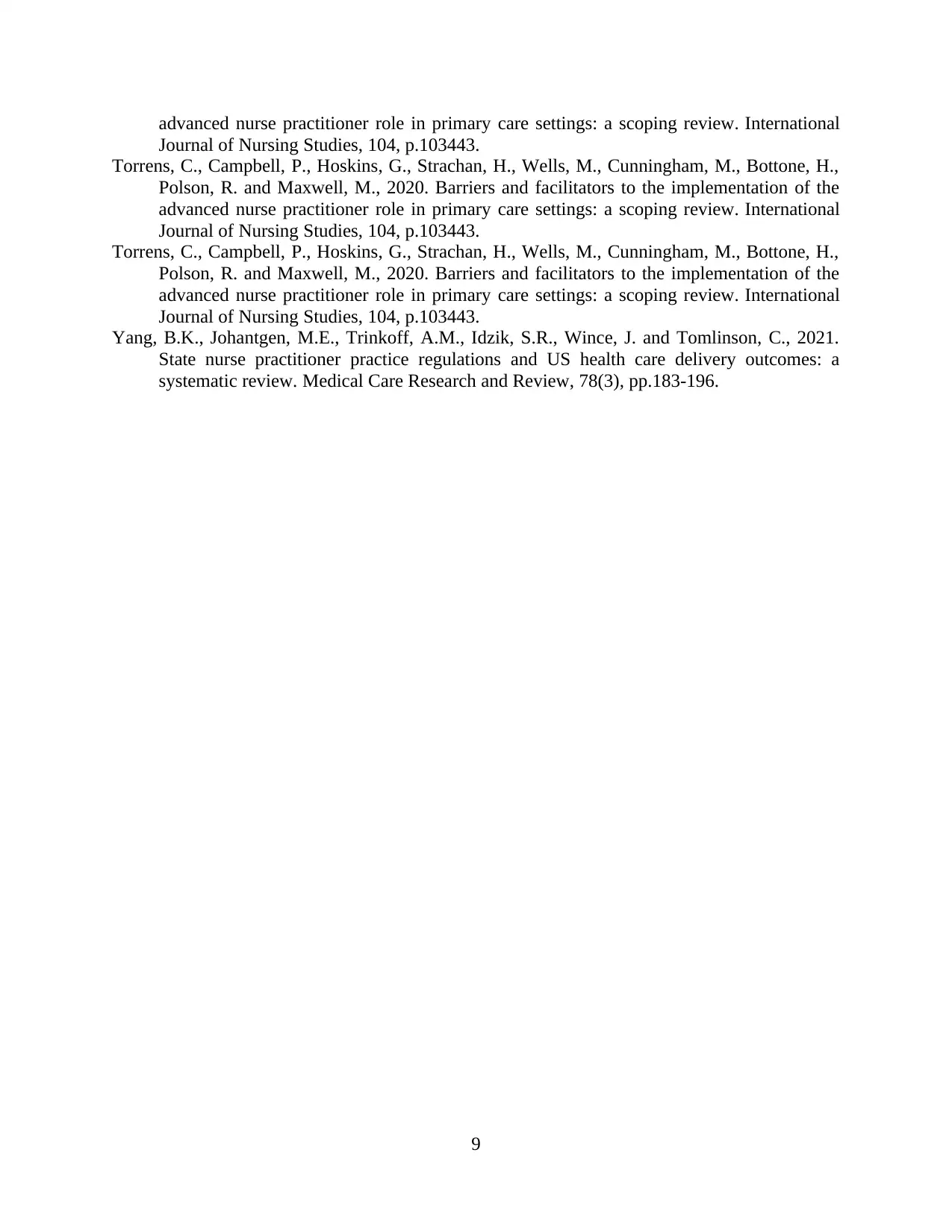
advanced nurse practitioner role in primary care settings: a scoping review. International
Journal of Nursing Studies, 104, p.103443.
Torrens, C., Campbell, P., Hoskins, G., Strachan, H., Wells, M., Cunningham, M., Bottone, H.,
Polson, R. and Maxwell, M., 2020. Barriers and facilitators to the implementation of the
advanced nurse practitioner role in primary care settings: a scoping review. International
Journal of Nursing Studies, 104, p.103443.
Torrens, C., Campbell, P., Hoskins, G., Strachan, H., Wells, M., Cunningham, M., Bottone, H.,
Polson, R. and Maxwell, M., 2020. Barriers and facilitators to the implementation of the
advanced nurse practitioner role in primary care settings: a scoping review. International
Journal of Nursing Studies, 104, p.103443.
Yang, B.K., Johantgen, M.E., Trinkoff, A.M., Idzik, S.R., Wince, J. and Tomlinson, C., 2021.
State nurse practitioner practice regulations and US health care delivery outcomes: a
systematic review. Medical Care Research and Review, 78(3), pp.183-196.
9
Journal of Nursing Studies, 104, p.103443.
Torrens, C., Campbell, P., Hoskins, G., Strachan, H., Wells, M., Cunningham, M., Bottone, H.,
Polson, R. and Maxwell, M., 2020. Barriers and facilitators to the implementation of the
advanced nurse practitioner role in primary care settings: a scoping review. International
Journal of Nursing Studies, 104, p.103443.
Torrens, C., Campbell, P., Hoskins, G., Strachan, H., Wells, M., Cunningham, M., Bottone, H.,
Polson, R. and Maxwell, M., 2020. Barriers and facilitators to the implementation of the
advanced nurse practitioner role in primary care settings: a scoping review. International
Journal of Nursing Studies, 104, p.103443.
Yang, B.K., Johantgen, M.E., Trinkoff, A.M., Idzik, S.R., Wince, J. and Tomlinson, C., 2021.
State nurse practitioner practice regulations and US health care delivery outcomes: a
systematic review. Medical Care Research and Review, 78(3), pp.183-196.
9
1 out of 11
Related Documents
Your All-in-One AI-Powered Toolkit for Academic Success.
+13062052269
info@desklib.com
Available 24*7 on WhatsApp / Email
![[object Object]](/_next/static/media/star-bottom.7253800d.svg)
Unlock your academic potential
© 2024 | Zucol Services PVT LTD | All rights reserved.





